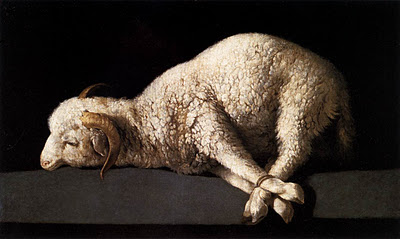 Kevin Vanhoozer’s essay “The Atonement in Postmodernity: Guilt, Goats and Gifts” (in Hill & James (eds), The Glory of the Atonement: Biblical, Theological & Practical Perspectives, 367-404) responds to postmodern critiques of atonement theories generally, and the penal substitutionary theory of atonement specifically. For some postmodern theorists, atonement theories seeking to understand and explicate the death of Jesus are problematic on two fronts: first they are reductionist, attempting to ‘control’ the biblical material that witnesses to the death of Christ, and hence second, are violent, imposing a ‘system’ on this material.
Kevin Vanhoozer’s essay “The Atonement in Postmodernity: Guilt, Goats and Gifts” (in Hill & James (eds), The Glory of the Atonement: Biblical, Theological & Practical Perspectives, 367-404) responds to postmodern critiques of atonement theories generally, and the penal substitutionary theory of atonement specifically. For some postmodern theorists, atonement theories seeking to understand and explicate the death of Jesus are problematic on two fronts: first they are reductionist, attempting to ‘control’ the biblical material that witnesses to the death of Christ, and hence second, are violent, imposing a ‘system’ on this material.
The scandal of the cross, for postmoderns, is that theory reduces otherness precisely by explaining it. Postmoderns might say that we need to recover the scandal—the paradox, the ‘aporia’—of the cross through a ‘sacrifice’ of the intellect, acknowledging that conceptual thinking has here reached its limit, its death. … The challenge for theology is to ‘theorize’ the cross (i.e., in a doctrinal formulation) while simultaneously respecting it (i.e., as an ‘other’ that eludes our conceptual grasp). The problem is that theologies of the atonement seem unable to articulate a theory that explains the saving significance of Jesus’ death without betraying the rich testimonies to the event of his death (369, original emphasis).
With respect to penal substitution, the problem is not simply the attempt to render an explanation of the saving significance of Jesus’ death, but the content of the doctrine is also abhorrent: it is thought to legitimise personal and social violence by portraying God as violent, and thereby legitimising a view, practice, and system of retributive—violent—“justice.”
Hence, the scandal of the cross is not metaphysical (how could God suffer and die?) but moral: Does God need to be placated before he can love and forgive? Is God party to an economy of retaliatory exchange? (372, original emphasis).
The idea of atonement as a form of exchange is repudiated by postmoderns: “The operative concept in postmodern theological understandings of the atonement is excess, not exchange. The death of Jesus exceeds our attempts to explain it” (396, original emphasis). God, in this view, does not maintain a ‘moral’ or ‘legal’ economy in which every wrongdoing attracts a penalty of retribution, for retribution alone is not transformative (378).
Vanhoozer examines Girard’s theory that Jesus’ death was as the scapegoat that unmasked the ‘scapegoat mechanism’ which functions at the heart and foundation of every society, culture and institution. The scapegoat mechanism, according to Girard, secures the peace of a particular group by assigning blame and violent retribution to a third party, a victim which by its sacrifice saves the group from tearing itself apart. By taking the place of the scapegoat, Jesus unmasked and repudiated this sacred sacrificial violence. His death was not a sacrifice for us, but rather his exemplary death shows that pattern of divine love which submits to human violence in order to absorb and transcend it.
Jesus’ suffering and death were necessary because of the world’s inability to free itself from the cycle of rivalry and violence, not because God’s justice demanded death. … The death of Christ is thus a unique breakthrough, a decisive event in the history of human consciousness. The purpose of his death is to end all scapegoating, all sacrifices (387).
Postmodern theorists and theologians have also questioned the ‘economy of the gift’ (Vanhoozer discusses Milbank, Derrida, Marion, and Ricoeur):
As soon as we give something to someone, we put that person in our debt, thus taking, not giving. The gift disappears in a web of calculation, interest and measure. Such is the aporia of the gift, according to Derrida. It cannot be given without creating an economy of debt (392, original emphasis).
So long as the gift of God is viewed as part of an economy of debt or exchange, God is implicated in a dubious and oppressive system. But the idea of gift need not be reduced to a system of exchange in which the gift issues in debt and duty. Rather, a gift may exceed all expectations:
Ricoeur especially wants us to get beyond the ‘moral vision,’ together with its economy of retribution and logic of equivalence, in order to perceive the ‘eschatological vision,’ with its economy of restoration and its logic of extravagant excess. The moral vision is guilty, Ricoeur thinks, of an overly literalistic reading. … It is only by interpreting within the old economy of law, where the loss of an eye demands exact compensation (another eye), that we arrive at the notion of penal substitution theory of atonement. … In Ricoeur’s view, the doctrine of atonement belongs, not in an economy of crime and punishment, but in a hyper-economy of gift and grace (395-396).
Continued tomorrow…